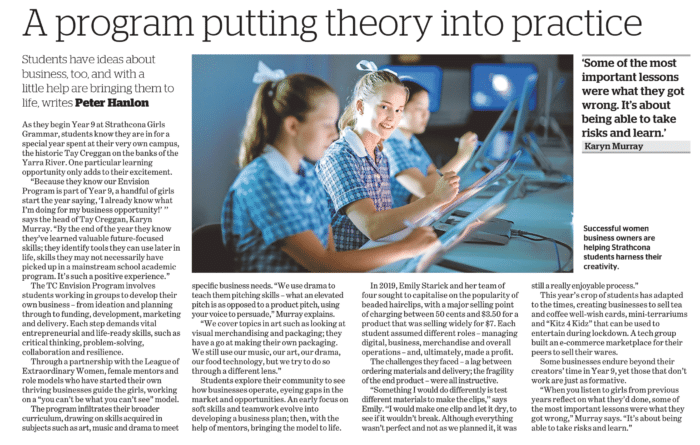IN The Media: The Age, Sunday 16 August 2020
Students have ideas about business, too, and with a little help are bringing them to life, writes Peter Hanlon
As they begin Year 9 at Strathcona Girls Grammar, students know they are in for a special year spent at their very own campus, the historic Tay Creggan on the banks of the Yarra River. One particular learning opportunity only adds to their excitement.
“Because they know our Envision Program is part of Year 9, a handful of girls start the year saying, ‘I already know what I’m doing for my business opportunity!’ ’’ says the head of Tay Creggan, Karyn Murray. “By the end of the year they know they’ve learned valuable future-focused skills; they identify tools they can use later in life, skills they may not necessarily have picked up in a mainstream school academic program. It’s such a positive experience.”
The TC Envision Program involves students working in groups to develop their own business – from ideation and planning through to funding, development, marketing and delivery. Each step demands vital entrepreneurial and life-ready skills, such as critical thinking, problem-solving, collaboration and resilience.
Through a partnership with the League of Extraordinary Women, female mentors and role models who have started their own thriving businesses guide the girls, working on a “you can’t be what you can’t see” model.
The program infiltrates their broader curriculum, drawing on skills acquired in subjects such as art, music and drama to meet specific business needs.“We use drama to teach them pitching skills – what an elevated pitch is as opposed to a product pitch, using your voice to persuade,” Murray explains.
“We cover topics in art such as looking at visual merchandising and packaging; they have a go at making their own packaging. We still use our music, our art, our drama, our food technology, but we try to do so through a different lens.”
Students explore their community to see how businesses operate, eyeing gaps in the market and opportunities. An early focus on soft skills and teamwork evolve into developing a business plan; then, with the help of mentors, bringing the model to life.
In 2019, Emily Starick and her team of four sought to capitalise on the popularity of beaded hairclips, with a major selling point of charging between 50 cents and $3.50 for a product that was selling widely for $7. Each student assumed different roles – managing digital, business, merchandise and overall operations – and, ultimately, made a profit.
The challenges they faced – a lag between ordering materials and delivery; the fragility of the end product – were all instructive. “Something I would do differently is test different materials to makethe clips,’’ says Emily. ‘‘I would make one clip and let it dry, to see if it wouldn’t break. Although everything wasn’t perfect and not as we planned it, it was still a really enjoyable process.”
This year’s crop of students has adapted to the times, creating businesses to sell tea and coffee well-wish cards, mini-terrariums and “Kitz 4 Kidz” that can be used to entertain during lockdown. A tech group built an e-commerce marketplace for their peers to sell their wares.
Some businesses endure beyond their creators’ time in Year 9, yet those that don’t work are just as formative.
“When you listen to girls from previous years reflect on what they’d done, some of the most important lessons were what they got wrong,” Murray says. “It’s about being able to take risks and learn.”


